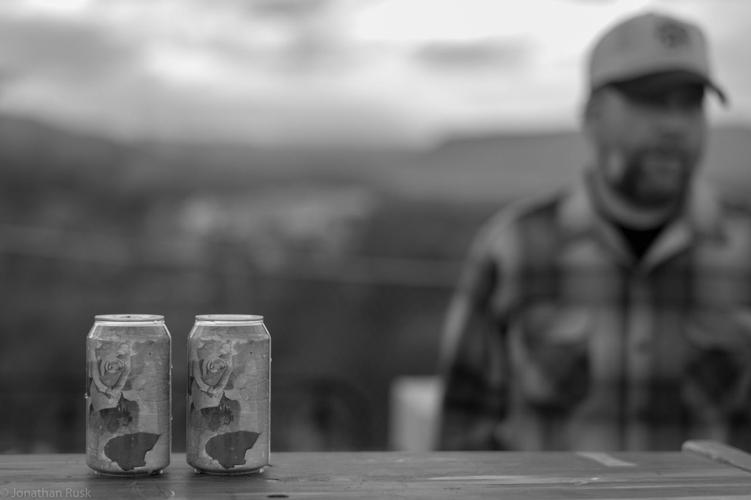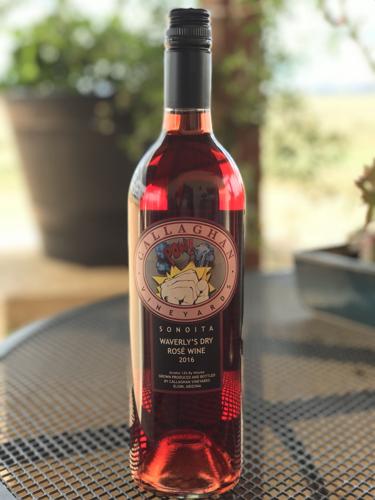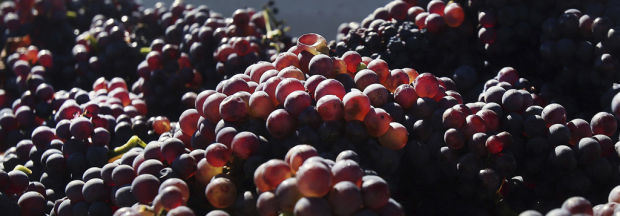Todd Bostock remembers a time in the mid-2000s when he was lucky if he could sell 50 cases of his Dos Cabezas Wineworks Pink rosé.
These days, he’s lucky if he has any left to sell during the vintage’s high summertime season.
“We’ve gone from selling maybe 50 cases of rosé in a year to selling 1,000-plus cases in less than a year,” he said. “It’s become a big seller for us.”
“Right now is a pretty ideal time to be outside and drinking rosé. You can go to Arizona Wine Collective and pick up a bottle of wine and have a pretty great experience. But to also come down here and experience it in context is the sort of thing you leave with a pretty strong impression of the value of the product. … If you just pick it off the shelf you may never ever get it.”
He figures he has enough Pink rosé on hand to take him through July. He sells Pink by the bottle ($19) or as Carbonated Pink in a 16-ounce can ($12.50), which is available in Tucson at AJ’s Fine Foods, Time Market, Arizona Wine Collective and Feast.
Dos Cabezas started canning its Pink rosé as a sparkling wine in spring 2015, ahead of a national movement that summer that saw dozens of canned wines enter the market. Today, the canned wine market is estimated to be worth north of $45 million a year, according to the beverage industry market research firm BW 166. Canned wine sales jumped 43% in the year between June 2017 and 2018, the firm reported.
Rosés seem to be one of the drivers of those increases, according to Southern Arizona wineries. Dos Cabezas’s Bostock said he believes the increase is largely because Arizona winemakers are making better quality wines.
Rosé is produced when red grapes are lightly crushed and left soaking in the juice with their skins in a process that can take anywhere from a few hours to a few days. The result is a pink wine that is lighter and brighter than its white cousin. It’s also less expensive, which could be one reason it has gained a strong following among millennials, who in 2015 consumed 42 percent of the wine consumed in the United States, according to the Wine Market Council.
Bostock’s Pink is a blend of Garnacha, Syrah, Monastrell, Graciano and Picpoul blanc grapes sourced mostly from his vineyard in Willcox. The 2018 rosé is his first sourced exclusively from his Sonoita vineyard, which Al Buhl started in 1995. Bostock joined Dos Cabezas in 2002 as a winemaker and took over the vineyards in late 2006.
Arizona also has a Mother Nature edge in the rosé market “because it’s a reasonably warm environment,” said Kent Callaghan, whose Callaghan Vineyards is one of the state’s oldest. And that warm weather also makes rosés more attractive when it comes to consuming wine in the summertime.
“The climate is obviously conducive to heavy consumption of rosé — refreshing, cold,” he said.
Callaghan’s rosés have won national awards including his 2016 AZ Dry Rosé, which took the gold medal in the 2018 San Francisco Chronicle Wine Competition. Since he planted his first vines in summer 1990, he has produced some of the state’s most awarded vintages including gold and silver medals in a number of national competitions. He also boasts on his website that his wines have been served at the White House four times including by President Bill Clinton.
Callaghan’s neighbor, Arizona Hops & Vines, advertises its Over the Moon rosé as the perfect complement to “pulled pork, a burrito supreme from Taco Bell, or an Almond Joy you stole from your kid’s Halloween bag.”
“So many wine regions became known because food dictates a lot of what drives the production,” said winemaker Megan Haller, who owns Arizona Hops & Vines with her sister Shannon Zouzoulas.
Haller said demand for rosé rises in the summertime when wine drinkers are looking for a more versatile and refreshing wine that can be consumed poolside or at the family barbecue. Think of it, she said, as the go-anywhere wine, perfect for a baseball game or a rodeo.
“The focus is on pleasure,” added Bostock. “The wine is delicious and refreshing in the summertime.
“It’s a wine that you don’t overthink.”






